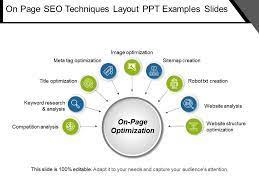SEO Techniques: Boost Your Website’s Visibility
In today’s digital age, having a strong online presence is crucial for businesses of all sizes. Search Engine Optimization (SEO) plays a vital role in improving your website’s visibility and driving organic traffic. By implementing effective SEO techniques, you can enhance your website’s ranking on search engine results pages (SERPs) and attract more potential customers.
Keyword Research
Keyword research is the foundation of any successful SEO campaign. It involves identifying the keywords and phrases that your target audience uses when searching for products or services similar to yours. By optimizing your website with these relevant keywords, you increase the chances of appearing in search results when potential customers are looking for what you offer.
Tools like Google Keyword Planner, SEMrush, and Moz Keyword Explorer can assist you in finding high-volume keywords with low competition. Remember to use a mix of long-tail keywords (specific phrases) and short-tail keywords (broader terms) to capture different types of search queries.
On-Page Optimization
On-page optimization refers to optimizing various elements on your website to improve its visibility on search engines. Here are some key techniques:
- Title Tags: Each page should have a unique and descriptive title tag that includes relevant keywords.
- Meta Descriptions: Write compelling meta descriptions that accurately summarize the content of each page and entice users to click.
- Header Tags: Use header tags (H1, H2, H3, etc.) to structure your content and make it easier for search engines to understand.
- URL Structure: Create clean and user-friendly URLs that include relevant keywords.
- Keyword Placement: Incorporate your target keywords naturally throughout your content, including in headings, paragraphs, and image alt tags.
Quality Content Creation
Creating high-quality and engaging content is essential for both users and search engines. When you provide valuable information or insightful articles, users are more likely to spend time on your website and share your content. This engagement signals to search engines that your website is relevant and authoritative, leading to improved rankings.
Focus on producing informative blog posts, articles, videos, or infographics that address the needs and interests of your target audience. Incorporate relevant keywords naturally within the content while ensuring it remains readable and valuable.
Link Building
Link building is an integral part of SEO. It involves acquiring high-quality backlinks from other reputable websites to improve your website’s authority and credibility. When other sites link to yours, search engines view it as a vote of confidence in your content.
You can build backlinks through various strategies:
- Guest Blogging: Contribute guest posts to authoritative websites in your industry with a link back to your site.
- Social Media Promotion: Share your content on social media platforms to increase visibility and encourage others to link back to it.
- Influencer Outreach: Collaborate with influencers or industry experts who can mention or link to your website in their content.
- Broken Link Building: Find broken links on other websites within your niche and offer them a replacement link from your site.
Monitor Performance and Adapt
SEO is an ongoing process, and it’s essential to monitor your website’s performance regularly. Use tools like Google Analytics and Google Search Console to track your organic traffic, keyword rankings, and user behavior on your site.
Based on the data you collect, adapt your SEO strategies accordingly. Identify which keywords are driving the most traffic, analyze user engagement metrics, and make improvements to underperforming pages.
Remember that SEO is a long-term investment, and results may not be immediate. Consistency and patience are key as you continue to refine your techniques and adapt to changes in search engine algorithms.
By implementing these effective SEO techniques, you can enhance your website’s visibility, attract more organic traffic, and ultimately grow your online presence. Stay up-to-date with the latest trends and best practices in SEO to ensure that you maintain a competitive edge in the digital landscape.
7 Essential SEO Techniques to Elevate Your Website’s Search Engine Ranking
- 1. Optimize your website’s meta tags, including title tags and meta descriptions, with relevant keywords.
- 2. Create high-quality and original content that is valuable to your target audience.
- 3. Use proper header tags (H1, H2, etc.) to structure your content and make it more readable for both users and search engines.
- 4. Build quality backlinks from reputable websites in your industry to improve your website’s authority.
- 5. Ensure your website is mobile-friendly and has a fast loading speed for better user experience.
- 6. Conduct keyword research to identify the most relevant and high-traffic keywords for targeting in your content.
- 7. Regularly monitor and analyze your website’s performance using SEO tools to identify areas of improvement.
1. Optimize your website’s meta tags, including title tags and meta descriptions, with relevant keywords.
Optimizing your website’s meta tags, such as title tags and meta descriptions, with relevant keywords is a crucial SEO technique. These tags provide search engines and users with a concise summary of your webpage’s content. By incorporating targeted keywords into these meta tags, you increase the chances of your website appearing in relevant search results. A well-optimized title tag can attract users’ attention and entice them to click on your link, while an informative meta description can improve click-through rates. Remember to keep these tags concise, compelling, and aligned with the content on your webpage to maximize their effectiveness in improving your website’s visibility and driving organic traffic.
2. Create high-quality and original content that is valuable to your target audience.
Creating high-quality and original content that is valuable to your target audience is a crucial aspect of effective SEO techniques. When you provide valuable information, insights, or solutions through your content, you not only engage and retain your audience but also establish yourself as an authoritative source in your industry. By focusing on delivering valuable content that addresses the needs and interests of your target audience, you can attract more organic traffic, increase user engagement, and improve your website’s visibility on search engine results pages. Remember, quality content is not only appreciated by users but also valued by search engines in determining the relevance and credibility of your website.
3. Use proper header tags (H1, H2, etc.) to structure your content and make it more readable for both users and search engines.
Properly using header tags (H1, H2, etc.) is a crucial SEO technique that significantly improves the readability of your content for both users and search engines. By structuring your content with appropriate header tags, you provide a clear hierarchy and organization to your web pages. This allows users to easily scan and understand the main points of your content, enhancing their overall experience. Additionally, search engines rely on header tags to comprehend the context and relevance of your content, which can positively impact your website’s visibility in search results. So remember, utilizing proper header tags not only improves readability but also boosts your SEO efforts.
4. Build quality backlinks from reputable websites in your industry to improve your website’s authority.
Building quality backlinks from reputable websites in your industry is a crucial SEO technique that can significantly enhance your website’s authority. When established and trusted websites link to your content, search engines perceive it as a vote of confidence and credibility. These backlinks not only drive direct referral traffic but also signal to search engines that your website is a reliable source of information. By actively seeking out opportunities for collaboration, guest blogging, or influencer outreach, you can attract valuable backlinks that will boost your website’s visibility and improve its overall ranking in search engine results.
5. Ensure your website is mobile-friendly and has a fast loading speed for better user experience.
In today’s mobile-driven world, ensuring that your website is mobile-friendly and has a fast loading speed is crucial for providing an optimal user experience. With the majority of internet users accessing websites through their smartphones or tablets, it’s essential to have a responsive design that adapts seamlessly to different screen sizes. Additionally, a fast loading speed is vital as users expect instant access to information and are likely to abandon a website that takes too long to load. By prioritizing mobile-friendliness and fast loading times, you not only improve user satisfaction but also increase your chances of higher search engine rankings, as search engines like Google consider these factors when determining website rankings.
6. Conduct keyword research to identify the most relevant and high-traffic keywords for targeting in your content.
Conducting keyword research is a crucial step in implementing effective SEO techniques. By identifying the most relevant and high-traffic keywords for your content, you can optimize your website to attract the right audience. Keyword research tools like Google Keyword Planner or SEMrush help you uncover popular search terms that align with your business and industry. By strategically incorporating these keywords into your content, you increase the chances of ranking higher in search engine results and driving organic traffic to your website. Remember, choosing the right keywords is essential for targeting the right audience and boosting your online visibility.
7. Regularly monitor and analyze your website’s performance using SEO tools to identify areas of improvement.
Regularly monitoring and analyzing your website’s performance using SEO tools is a crucial tip in optimizing your SEO techniques. By keeping a close eye on your website’s metrics, such as organic traffic, keyword rankings, and user behavior, you can identify areas of improvement and make data-driven decisions. These insights allow you to adapt your strategies, optimize underperforming pages, and capitalize on successful ones. By consistently monitoring and analyzing your website’s performance, you can stay ahead of the competition and ensure that your SEO efforts are effectively driving results.



